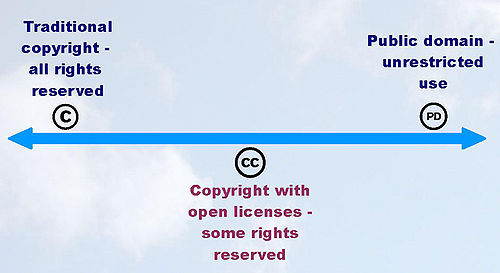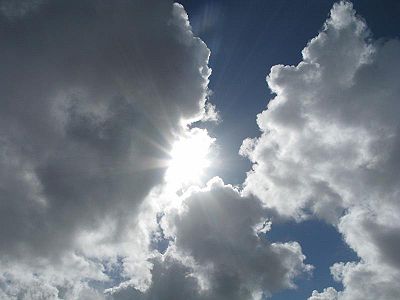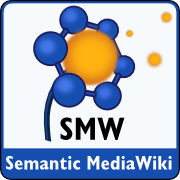Practical Semantic Mediawiki: Difference between revisions
| Line 118: | Line 118: | ||
* <nowiki>{{My Template}}</nowiki> — A template (reusable content, function or site value) | * <nowiki>{{My Template}}</nowiki> — A template (reusable content, function or site value) | ||
** Don't Repeat Yourself | ** Don't Repeat Yourself | ||
** Pipe symbol is used to pass parameters — <nowiki>{{ | ** Pipe symbol is used to pass parameters — <nowiki>{{Highlight|Anything}}</nowiki> can be used to consistently apply an appearance to anything passed as a parameter | ||
* <nowiki>{{ #geocode: Montréal, Quebec}}</nowiki> — Template function, in this case geocode turns a place name into geographic coordinates | * <nowiki>{{ #geocode: Montréal, Quebec}}</nowiki> — Template function, in this case geocode turns a place name into geographic coordinates | ||
* <nowiki>{{{1}}}</nowiki> — SMW variable, in this case the first value passed to a template | * <nowiki>{{{1}}}</nowiki> — SMW variable, in this case the first value passed to a template | ||
Revision as of 18:18, 25 November 2010
This hands-on session for non technical users emphasizes the "need to know" aspects of Web publishing, wikis, information design and Semantic Mediawiki for flexible, structured, practical re-usable content that fits into the Web of Data. It is not expected participants will become experts in all these topics, but will be able to create a site, and have an overview of what can be done as a basis of progressive learning.
Forward
Practice site: http://practice.zooid.org/wiki/Practice
Acronyms
- MW: Mediawiki
- SMW: Semantic Mediawiki
Web publishing
Difference between Semantic Mediawiki and static web sites, CMS, Mediawiki
- Static web sites can be more difficult to manage, it's harder to re-use content.
- Content management systems use forms to guide content editing, but they tend to require low level changes (database, programming), and end users have constrained access to the site
- Mediawiki is designed to organize large sets of pages, potentially with many involved people
- Semantic Mediawiki adds structured information and views
- We are going to learn markup encoding in order to have more control over content and appearance
- Designing information well makes it easier to find, consistent and re-usable.
Access models
- Fully open, no login required
- Require login for editing
- Require created accounts to edit (closed editing)
- Require created accounts to access (fully private)
- Encryption to avoid snooping
Access models can be changed over time; avoid starting a wiki with jargon or unsympathetic content.
Site users
- Levels
- De-emphasize control, make it as flat as possible
- Bureaucrats still exist - edit site-wide content and styles, block pages and users
- OpenID signin allows people to use account information from other OpenID sites
Practice: Create an account and sign in
Accessibility
Here, accessibility refers to supporting people with vision, keyboard control or cognitive difficulties.
- Making sites accessible generally increases usability
- Works on more devices from text browser to handheld
- Typically more straightforward navigation
- Accessible hot keys can be used by any expert user
- The curb cuts principle
- Mediawiki is accessible, SMW has issues (forms)
- Value content over appearance
- Good tags for images, image maps
Terms of use
- Creative Commons - share with options for attribution, non-commercial, changes
- Traditional copyright - by permission only
- Re-using content
Using Mediawiki
Mediawiki is the underlying software of Wikipedia. It is robust, relatively easy to host, and supported by a large community and supports hundreds of useful extensions.
Progressive uses
- Basic site with pages and categories
- You just need to know a few things for your wiki to be as useful as most Web sites
- Add widgets for more interactivity
- Wiki gardening to reorganize content
- Add semantic classes for reusable data
- Guide users of the site
- Viewer
- Casual editor
- Advanced editor, gardener
- Semantic coder
Creating pages
- How to name pages
- One topic per page
- Short, avoid special symbols, use sentence type capitalization, avoid Title Case unless appropriate
- Code and matching brackets
Basic markup
Rather than using a rich text editor, Mediawiki uses a progressively learned set of markup, that's designed to be human-readable, consistent and enforces meaning over appearance. It's not dependant on special programs, and could be carved into a park bench and retain its meaning.
- ''Italic'', '''Bold'''
- * List heading level one — use # for numbered list
- ** List level two — ## for numbered list
- ...
- ** List level two — ## for numbered list
- =Heading one=
- ==Heading two==
- ...
- ==Heading two==
- [[Mypage]] — A wiki link
- "Red links" are links to pages that don't exist
- [[File:Mypicture.png]] — Media (inline or link)
- A shortcut to creating images is to create the File: link first, then follow the red link to the upload form
- [[Mypage|This is my page]] Alternate link text (using pipe symbol)
- http://theirsite.com — A non-wiki link
- Use [] brackets and space after the link to use your own link text. [http://theirsite.com Their site].
- {{My Template}} — A template (reusable content, function or site value)
- Don't Repeat Yourself
- Pipe symbol is used to pass parameters — {{Highlight|Anything}} can be used to consistently apply an appearance to anything passed as a parameter
- {{ #geocode: Montréal, Quebec}} — Template function, in this case geocode turns a place name into geographic coordinates
- {{{1}}} — SMW variable, in this case the first value passed to a template
- Finding pages
- Starting new pages
- Proactive linking
- Brainstorm using links
Practice: Create a new page that's a unique generally recognized placename, include a link to another page and another site.
- Categories
- Subcategories
Practice: Put your page in a category, put that category in a sub-category
- Uploading images and files
- Moving pages
- Moving preserves the original link, can be useful for "also known as"
Practice: Move your page to a more specific location (Placename, Region), observe Special:RecentChanges
Bonus practice: Add an image, place it on the right and include a caption.
- Deleting pages
- Templates - used for consistently reused content
Making pages look good
CSS is the style system of Web pages and can also be used in Mediawiki. Like wiki markup, learning can be progressive.
Placeography | Biofuel Visions
- Re-using CSS styling <div style="background: orange">Hello world</div>
- Avoid losing meaning (don't use <big> for headers), keep it simple
- Re-using styles MediaWiki:Common.css
- Possible to hide MW's menus and change the 'skin'
Practice: Add <div class="noticebox">...</div> to some page content
Bonus practice: Move your div to a reusable template
Semantic Mediawiki
SMW is an extension ecology of MW that allows marking up content for re-use, and creating easier to use forms and views.
- Meaning through annotations and relationships
- You define the relationships for your application
- Triples — subject, predicate, object
- Subject — what we're talking about
- Predicate — the relationship type
- Object - what the subject is being related to
- Combine them and you can flexibly describe anything
- Montréal is a place
- Montréal has population 1,906,811
- Montréal has geographic coordinates 45.5088889, -73.5541667
- What properties does your content need to be useful?
Examples
- Form: Asian Canadian Wiki
- Form: Biofuels vision
- Databases: Genozymes environmental databases
Inline property annotation
Single instances of data can be marked-up using annotations. Annotations look like categories, but they use a double colon. The first part is the relationship type, the second either a value or object page.
- [[Date::Jan 1, 2011]] — A date value that adds a date to the page it's on.
- [[asserted by::David Mason]] — A page link that asserts the page it's on
Page: Montreal
- [[A::Place]]
- [[Population::1906811]]
- [[Geographic coordinates::45.5088889, -73.5541667]]
Practice: Add a population annotation to your place.
- Built-in types
- Geographic coordinate
- Viewing all properties
- Subtypes
Queries
"Ask" queries can be added to any page to add links or values from other pages according to parameters, for example, by category, pages that have particular values, etc.
- {{ #ask: [[A::Place]] }}
- {{ #ask: [[Category:City]] }}
Classes
Instead of using inline property assignments, semantic classes use templates with value assignments. This allows display formatting and further, consistent semantic interaction according to the template name (which is usually the category).
Practice: Change your page so it's a an Entity.
Page: Montréal
{{Entity
|A=Place
|Population=10000
}}
- http://practice.zooid.org/wiki/Special:CreateClass (template, properties, forms)
- One topic per page
- Formlink {{#formlink:Comment|Add a comment}}</formlink>
- Class templates will often contain queries that show linked classes
Practice: Create your own semantic class with template, properties, form. Add pages to it http://practice.zooid.org/wiki/Special:Forms
Views
- Format= parameter to queries
- {{ #ask: [[Geographic coordinate::+]]|format=map}}
- Timeline, Calendar, Map, Facet browser
Basic inference
Inference is used to derive information from basic information.
{{#ifexpr: {{{Population|}}} > 50000 | [[Category:City]] }}
If the page's population is greater than 50000, then put it in the category of city.
This is a simple form of artificial intelligence, that be very useful for large sets of pages for arbitrary classifications.
Future directions
- Relating ontologies (categories and properties) between sites
- Reusing content
- Creating a big picture across the web where anyone can ask questions and add their data
Mediawiki Widgets
Mediawiki Widgets allow embedding third-party site content for rich media (Youtube, photo sites, etc) and interactive discussions (DISQUS, Twitter, etc) without needing to set it up or host it on your site.
- DISQUS discussion
- Register with DISQUS
- Get key
- Create widget
- Embed widget on pages
Converting content or sites
- Pandoc
- Convertors for Open Office, Microsoft Word
Hosting
- Export a site, modularize by category
- Complete site export
- Special:Version
- Free light/startup hosting
- Inexpensive Mediawiki with SMW option
- Wikia
- Self-hosting
Getting help
- View source of pages
- Mediawiki help sites and community
- Semantic mediawiki help sites and community
- If it's for an open cause, ask me
- Let's form a user group



